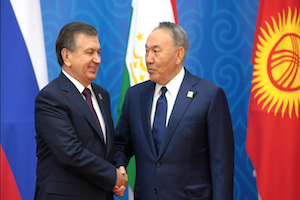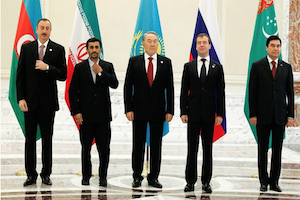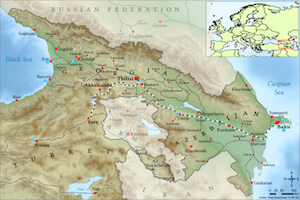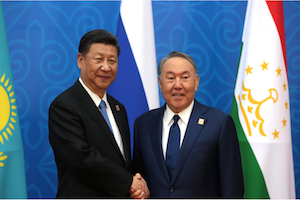Deepening Central Asian Nonproliferation Partnerships
By Richard Weitz
February 22, 2018, the CACI Analyst
Preventing the proliferation of weapons of mass destruction (WMD) has been a priority for Uzbek-U.S. and Kazak-U.S. relations for decades. Uzbekistan and Kazakhstan are surrounded by nuclear weapons states and lie at the crossroads of potential WMD trafficking routes. As the U.S. struggles to keep North Korea and Iran from obtaining nuclear weapons, deny WMDs from terrorists and other actors, and sustain a major security presence in Central Asia, partnering with Uzbekistan and Kazakhstan against WMDs offers low-cost, high-yield opportunities.

Is there an Agreement on Caspian Sea Delimitation?
By Stephen Blank
January 25, 2018, the CACI Analyst
On December 5, 2017, Russian Foreign Minister Sergei Lavrov announced that all the key issues regarding the delimitation of the Caspian Sea had been resolved and that a treaty was being prepared for heads of state to sign in 2018 in Astana. Yet less optimistic statements from the other parties, particularly Iran, suggest that Lavrov’s assessment was premature. If Russia and Iran can nevertheless reconcile their differences on the demarcation of the Caspian, this would have important strategic consequences not only for the littoral states, but also for the Caucasus, Central Asia and the Middle East.

Kazakhstan, Georgia and Azerbaijan Support Spain's Integrity
By Stephen Blank
December 13, 2017, the CACI Analyst
Recently, Kazakhstan, Georgia and Azerbaijan proclaimed their support for and recognition of Spain’s territorial integrity. These announcements were obviously triggered by the outbreak of the crisis around Catalonia’s independence referendum. While Spain’s political destiny is hardly a vital interest for these governments, they do worry about the continuing episodes of minority unrest that could furnish precedents for the dissolution of other multi-ethnic or multi-confessional states like them. On this point, these three governments, probably along with all the others in what used to be the Soviet Union, have justified reasons for concern.

Baku-Tbilisi-Kars Railway to Become Central Asia's Gateway to Europe
By Fuad Shahbazov
December 7, 2017, the CACI Analyst
On October 30, 2017, Azerbaijan’s President Ilham Aliyev, along with Turkey’s President Recep Tayyip Erdogan, Georgia’s Prime-minister Giorgi Kvirikashvili, Kazakhstan’s Prime Minister Bakytzhan Sagintayev, and Uzbekistan’s Prime Minister Abdulla Aripov attended the opening ceremony of the long-delayed Baku-Tbilisi-Kars (BTK) railway. “The opening of the railway is of historic and strategic significance,” Aliyev said at the ceremony in the Caspian port city of Alat, south of Baku, to mark the departure of the first trains. In fact, the opening of the new railway provides an alternative route to existing rail services carrying goods from Asia to Europe.

China's Aluminum Industrial Capacity Cooperation in Kazakhstan
By Tristan Kenderdine
October 19, 2017, the CACI Analyst
International Capacity Cooperation is China’s policy answer to comparative advantage, a vast state-planning exercise to coordinate China’s trade and investment strategy in external geographies. It is the practical industrial policy matrix allowing industries, local governments, and policy banking to intersect with partner economies as part of the wider geoeconomic Belt and Road strategy. For China’s aluminum sector, which is already heavily state subsidized and widely considered to be dumping on international markets, it represents an opportunity to extend the lifespan of the industrial policy and policy bank model. The formation of an aluminum capacity cooperation enterprise alliance should be a warning signal to the non-ferrous metals industries of China’s trading partners in Central Asia.



